BEACH CARE AND AWARE PROJECT
INTRODUCTION
With funding from Northumbrian Water Ltd, the Beach Care and Aware project has been working since April 2020 to reduce the quantity of damaging beach and marine litter on the beaches between the Tyne and the Tees. This has been achieved through engaging with schools, businesses and communities in conversations, activities and events. The project has increased awareness and pride in coastal waters and beaches and identified further ways the coastal environment can be improved and will leave a legacy of local ownership and care for our coastal waters.
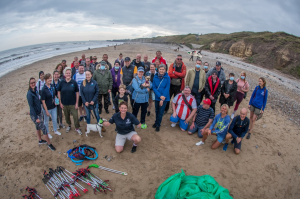
Litter surveys on UK beaches indicate that litter pollution is still a major problem and is not decreasing. Most litter comprises plastic and polystyrene, and food and drinks packaging. After heavy storms ghost fishing gear and tyres are often washed up on to the beach. Our Beach Care and Aware Project works with volunteers to remove this litter from the beach to stop it going back into the sea where it is harmful to the marine wildlife due to their potential threat of entanglement, ingestion, chemical toxicity or injury. This is in addition to the potential injury to humans and the damage to habitats, ecosystems and biodiversity.
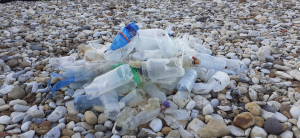
Plastic Bottles found on beach
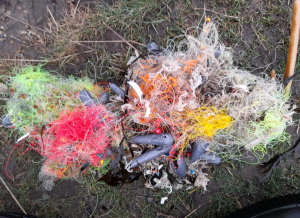
Ghost fishing line / weights found on beach
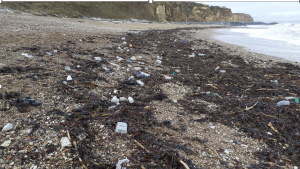
Red Acre Beach, Seaham after storm. Beach covered in plastic bottles
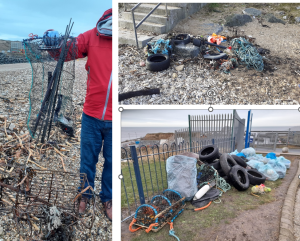
Examples of ghost fishing gear / tyres etc found on beach
Since the project began, over 449 beach clean sessions have taken place on the beaches from the Tyne to Tees resulting in the removal of 6203 bags of rubbish (over 12 tonne) from the beaches by 6156 volunteer days.
We have regular volunteers who help with our beach cleans and several Volunteer Beach Clean Leaders who run events on our behalf.
We also work with businesses and organisations on staff volunteer days. These events are great for staff well-being and team moral, with a lot of people working from home some volunteers are often meeting colleagues for the first time in person.
Schools, Colleges, and Universities play an important role in the Beach Care and Aware project with pupils and students regularly helping with beach clean ups and often taking part in campaigns within their places of education.
The Beach Care Officer regularly talks to school groups about the impact of marine litter and ways they can help the environment.
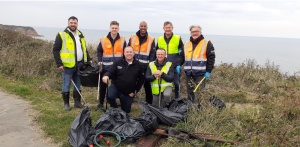
Staff from Tesco at Easington Colliery
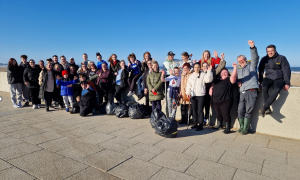
McDonalds Team Day
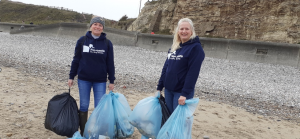
Newcastle Building Society at Seaham Hall beach
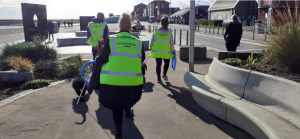
Greenham Trading Roker beach clean
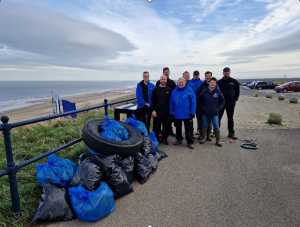
Northumbrian Water – Just an Hour initiative
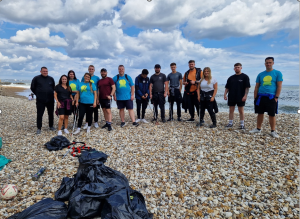
EE Staff volunteering day
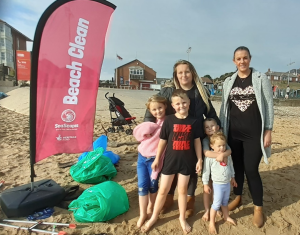
Family beach clean Roker
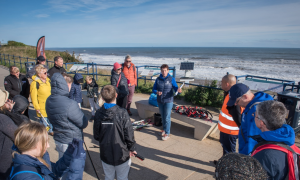
Volunteers at Crimdon
COMMUNITY GROUPS
During the 3-year period 42 community groups have been involved in the Beach Care and Aware project from Scout troupes, local charities, Women’s groups to community art groups, they have all played their part in supporting the project, either through beach cleaning activities, art workshops or simply spending time with the Beach Care Officer looking at the problem of beach litter and how they can help address the problem.
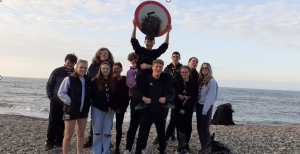
Explorer Scouts on beach clean
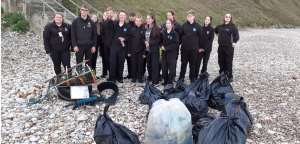
Junior Police Cadets on beach clean
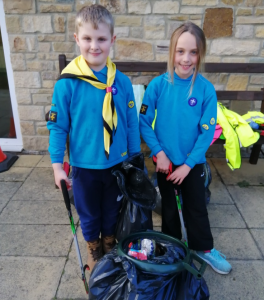
Beaver Scouts river litter pick for Source to Sea project
SCHOOLS, COLLEGES AND UNIVERSITIES
The Beach Care and Aware project has worked with 48 schools, colleges and universities, from reception age to post graduate level, engaging with over 800 pupils and students. The beach cleaning activities usually coincide with a topic on the national curriculum or team building exercises with the older pupils.
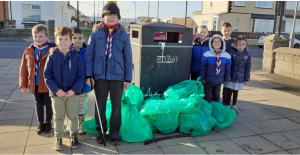
Cub Scouts at Hartlepool beach clean
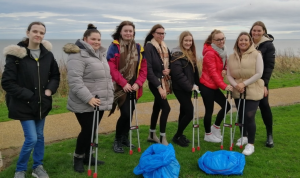
Students from New College, Durham
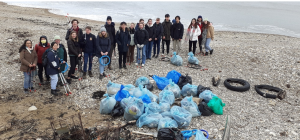
Durham University beach clean with international students
| YEAR 1 | YEAR 2 | YEAR 3 | TOTAL | |
| BUSINESSES | 24 | 47 | 38 | 109 |
| EDUCATIONAL ESTABLISHMENTS | 16 | 18 | 14 | 48 |
| COMMUNITY GROUPS | 17 | 12 | 13 | 42 |
| TOTAL | 57 | 77 | 65 | 199 |
Summary of Businesses, Educational Establishments and Community Group involvement
VOLUNTEER BEACH CLEAN LEADERS
We have Volunteer Beach Clean Leaders (VBCL) who come from a variety of different backgrounds, and all have a passion for the marine environment. They are fully trained to lead beach cleans on behalf of SeaScapes. The VBCL’s have received training on Plastic Pollution, WISE Training, First Aid, Marine Conservation Society training and have attended conferences as part of the wider SeaScapes Team.
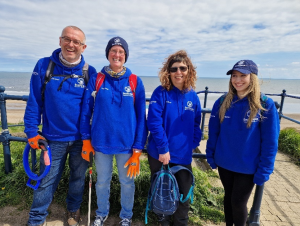
Volunteer Beach Clean Leaders
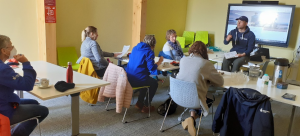
At WISE Training on Marine Mammal disturbance
BEACH LITTER – What is the Real Problem?
Litter lands on our beaches in a variety of ways. Most litter is from land-based sources and carried by storm drains, streams and rivers leading to the sea, most of this rubbish is plastic. Windblown rubbish from landfills and litter bins can add to the litter problem and storms and accidents at sea can cause ships to lose cargo. Human activity (people not taking rubbish home after a day on the beach), discarded fishing related items, sewage related debris (wipes, cotton bud stick, sanitary products) can also be found on the beach after storms. All these items can have detrimental effects on the environment, fragile habitats and animals, and also the local economy – who wants to visit dirty beaches?
Plastic breaks down into smaller pieces called microplastics and nanoplastics, these are very difficult to see and so are left to enter the food chain, they are often mistaken for food by birds causing death by starvation. Plastic remains in the environment for hundreds of years (possibly infinitely).
DID YOU KNOW? Every time you wash your clothes up to 700,000 microfibres enter our waterways. That adds up to an average of 91,000,000 microfibres leaving every single home, every year. Go to for more information on this huge problem https://www.cleaner-seas.com/#:~:text=Microplastics%20in%20our%20Oceans,This%20is%20a%20HUGE%20problem.
How long does rubbish take to bio-degrade? Over 400 years for the plastic hold tin cans together, and over 450 years for disposable nappies and plastic bottles. Fishing line takes over 600 years.
Learn more on the NOAA website and their marine debris program.
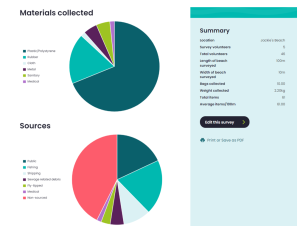
An example of beach survey data Jackie’s Beach, Whitburn 23rd September 2024, showing over half items collected were plastic.
THE WIDER PICTURE
In an ideal world we wouldn’t have to clean our beaches and sometimes it feels like a never-ending deluge of rubbish on the beach. That’s why we have joined forces with the Wear Rivers Trust and partners to look at way of reducing plastic entering rivers at source to reduce the damage to habitats, reducing water pollution and potentially injuring or killing wildlife. We are looking at ways of monitoring the amount and types of litter coming down the river as well as setting up an Education group with Environmental Education Specialists across the County and installing a barrier on the river to trap rubbish. There’s lots going on!
More information can be found on our newsletter: https://exploreseascapes.co.uk/wp-content/uploads/2023/11/051023-Final-Plastics-newsletter-3.pdf
WHAT CAN WE DO TO HELP?
For more information on marine litter, please go to the following websites.
https://www.onelessbottle.org/
https://www.sas.org.uk/plastic-pollution/plastic-pollution-facts-figures/
https://www.nwl.co.uk/binthewipe
https://theriverstrust.org/our-work/our-projects/preventing-plastic-pollution-ppp
Blue Planet II video https://www.youtube.com/watch?v=xLx4fVsYdTI


